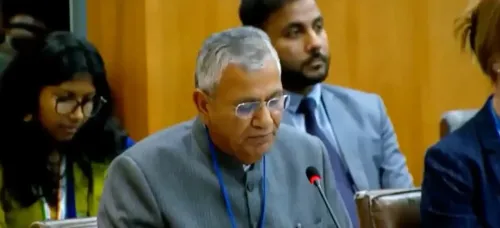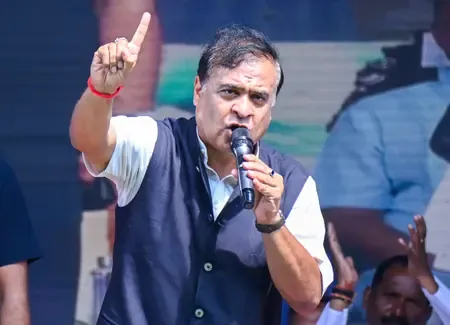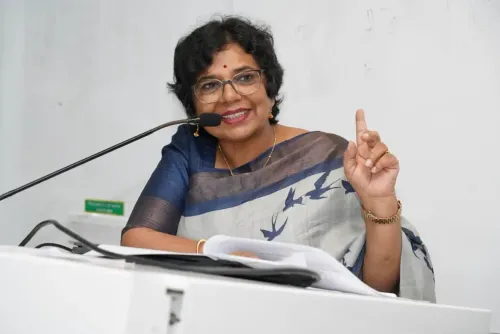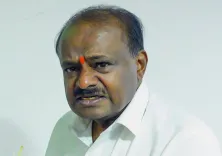Did CEC Gyanesh Kumar Address Rahul Gandhi’s Allegations in a Detailed Press Conference?
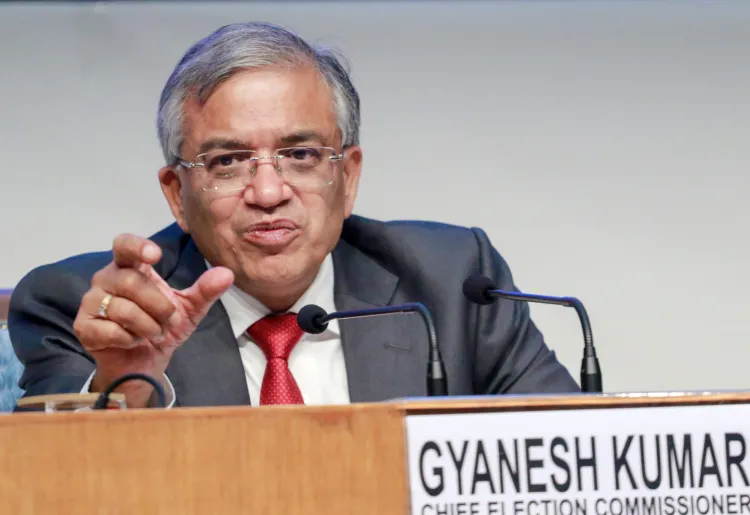
Synopsis
Key Takeaways
- CEC Gyanesh Kumar addresses allegations from Congress party.
- Clarification on voters with zero house numbers.
- Importance of transparency in electoral processes.
- Machine-readable lists are restricted for privacy reasons.
- Electoral integrity is crucial for democracy.
New Delhi, Aug 17 (NationPress) The Chief Election Commissioner (CEC) Gyanesh Kumar on Sunday challenged several assertions made by the Congress party, especially regarding allegations of ‘vote chori’, voters listed with zero house numbers, and claims of electoral roll manipulation. He also clarified why a machine-readable voter list has not been provided.
In a detailed response to Rahul Gandhi's accusations, CEC Gyanesh Kumar justified that electors with zero house numbers are not fraudulent entries and addressed the controversy surrounding 22 lakh 'sudden deaths' in Bihar's electoral rolls.
On the issue of electors with zero house numbers, Rahul Gandhi alleged during a recent press conference that numerous fake addresses were present in the Bangalore Central constituency, indicating a deceit by the electoral body.
In response, the CEC clarified that such cases occur both in rural and urban areas where house numbers have not been assigned by local authorities.
“In many urban areas, unauthorised colonies often lack house numbers. According to Election Commission (EC) standards, these voters are assigned notional numbers, which can appear as zero in the system. Additionally, many homeless voters are registered with zero addresses,” said CEC Gyanesh Kumar.
“To label these individuals as fraudulent voters is an affront to democracy. The EC stands firm in safeguarding their right to vote,” he emphasized.
On the Maharashtra ‘vote theft’ allegations, Rahul Gandhi and the Congress party have repeatedly accused the election commission of misconduct during assembly elections, particularly regarding an unusual increase in registered voters from the May 2024 Lok Sabha elections to the November 2024 Assembly polls, which they believe contributed to their defeat.
In response, the CEC pointed out that political parties had ample opportunity to review the electoral rolls and did not raise concerns until eight months after the elections.
He also noted that on polling day, voting typically peaks at 10% per hour, with less than 10% reported in the last hour, countering the accusations of irregularities.
Without directly naming Rahul Gandhi, he remarked that making allegations after election results are announced undermines public confidence in the electoral process.
“Once 45 days have passed without any party or candidate contesting the results, what is the purpose of making unfounded claims now? The public is aware of this,” he stated.
Regarding Rahul Gandhi's assertion that at least 1 lakh votes were manipulated in Karnataka, leading to the BJP's victory in the Bangalore Central constituency, the CEC explained the electoral protocol stating that any complaints must be submitted under oath to the electoral officer.
On the claim of 22 lakh sudden deaths in Bihar’s voter list, Gyanesh Kumar clarified that these were not new deaths but individuals long unaccounted for in the electoral rolls.
He acknowledged that while the system isn't flawless, rectifying such discrepancies requires active involvement from Booth Level Officers (BLOs) and Booth Level Agents (BLAs) appointed by political parties.
As for the lack of a machine-readable voter list, some Congress leaders have accused the EC of bias. In response, CEC Gyanesh Kumar explained that sharing machine-readable lists has been prohibited since a 2019 Supreme Court verdict due to concerns about data manipulation.
“We have seen media reports showing voter lists with images of electors without their consent – a clear violation of privacy,” he stated.
He also differentiated between the machine-readable voter list and the searchable voter list available on the Election Commission's website, where individuals can check their registration status.
Regarding the timing of the Systematic Voter’s Education and Electoral Participation (SIR) initiative, the CEC noted that it commenced on June 24 and concluded in July, aimed at cleansing the electoral rolls to fortify democracy.
“In 2003, Bihar also conducted the SIR within a month,” he added.
With over seven crore voters in Bihar, he asserted that the credibility of both the Election Commission and the electorate should not be questioned.
He cautioned against irresponsible claims like “vote theft,” labeling them as a disgrace to the Constitution.

